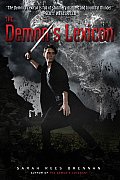Review of The Demon's Lexicon
/The Demon’s LexiconBy Sarah Rees BrennanMargaret K. McElderry Books, 2009 Fans of the hit TV show “Supernatural” (and anybody who’s seen it is very likely a fan) will find themselves in comfortable territory when reading The Demon’s Lexicon, Sarah Rees Brennan’s first installment in the ongoing adventures of the teen Ryves brothers, Alan and Nick.These brothers are on the run from a powerful cadre of demon-friendly magicians who want to retrieve the sorcerous talisman stolen years ago by Alan and Nick’s mother. Along the way, their mother has lost her wits, the whole family has lost their father, Alan’s lost the full use of one of his legs, and the boys have lost any semblance of a normal upbringing – they no sooner get comfortable in any one location than magician-spurred creepy-crawlies find them and the chase is on again:
Fans of the hit TV show “Supernatural” (and anybody who’s seen it is very likely a fan) will find themselves in comfortable territory when reading The Demon’s Lexicon, Sarah Rees Brennan’s first installment in the ongoing adventures of the teen Ryves brothers, Alan and Nick.These brothers are on the run from a powerful cadre of demon-friendly magicians who want to retrieve the sorcerous talisman stolen years ago by Alan and Nick’s mother. Along the way, their mother has lost her wits, the whole family has lost their father, Alan’s lost the full use of one of his legs, and the boys have lost any semblance of a normal upbringing – they no sooner get comfortable in any one location than magician-spurred creepy-crawlies find them and the chase is on again:
He [Nick] felt restless suddenly, and as he tuned out the others’ voices and wished for something to do, he registered again the sound that had woken him. Coming to him through heavy doors and solid walls, through all the expensive privacy of this house, were faint but unmistakable screams.It was obvious that the rest of them couldn’t hear it. He probably should let Alan know.“There is someone being tortured in this house.”Alan gave a guilty start, and it was clear to Nick that he at least already knew.
The basic premise here – two young brothers armed with nothing more than some magical lore and a pair of cool heads under fire, tackling all the various manifestations of black magic in a world that knows nothing about it and considers the brothers themselves weird and vaguely seedy – is the same one that entertains so many viewers of “Supernatural” every week (perhaps including Rees Brennan? She’s never said so publicly, to my knowledge), but there are some key differences. First, while the TV duo are in their twenties, Rees Brennan’s pair are teenagers – this is squarely in the Teen Fiction section of the bookstore, dealing with a dozen issues of high school alienation. Second, while our TV heroes are presented as a bit on the scruffy side – army jackets, worn out jeans, unwashed hair – at least one of the Ryves brothers is ready for his close-up: Nick, the younger brother, is described by virtually everyone (including himself) as a genuine “hottie” (when he tells one character that he generally gets by on his looks, he’s not joking).And third, even in this first volume, Demon’s Lexicon manages to be a whole lot better than “Supernatural,” even given the differences in media involved. This book is tense, funny, and lightning-fast, slowing down just long enough to gather up as many straggling readers as it can, then vaulting forward again at breakneck speed. Rees Brennan at a great clip presents a world she has obviously conceived in painstaking consistency – a world of intricate magical rules that make the various goings-on at Hogwarts look decidedly anemic.In an early scuffle with magician-spawned emissaries, Alan is ‘marked’ by a demon and thus cursed to die – unless the boys can kill two magicians in a rite that transfers the mystical death-sentence away from Alan. The urgency of the quest is just one of the many things in the book that serve to underscore the vast personal differences between the two Ryves brothers; both are courageous, both are devoted to their mother, but Alan is calm, rational, balanced, whereas sultry Nick (Rees Brennan must have been very pleased with the cover of the American edition) is not only headstrong and brooding but also more than a little feral — a warrior in the body of a varsity swimmer.Nick goes through his peripatetic life on a constant angry simmer, and the more cerebral Alan is naturally adept at keeping secrets, so any proficient reader will be able to guess how the plot of The Demon’s Lexicon explodes. Considering the enormous popularity of supernatural fiction in the teen market these days, some such predictability is probably inevitable and not necessarily a deal-breaker — the question becomes whether or not the action feels derivative, and here Rees Brennan has nothing to worry about: her book is very, very good — intelligent, gripping stuff. The future volumes are eagerly anticipated.






